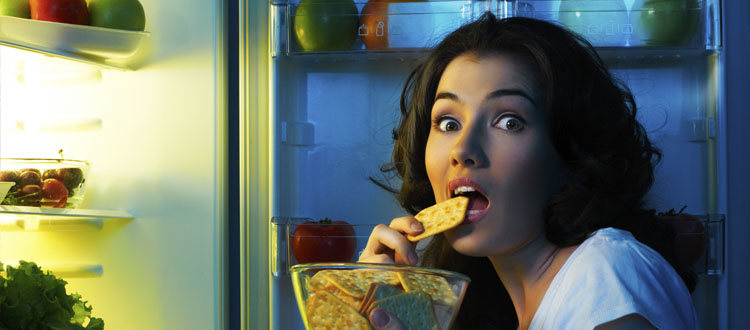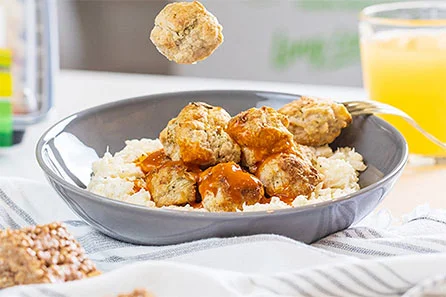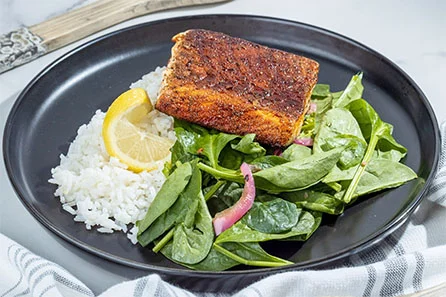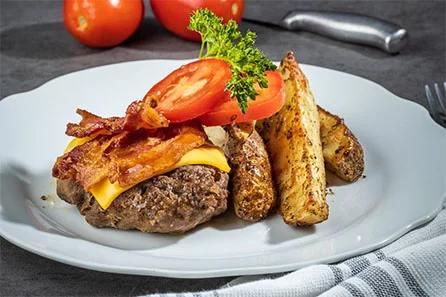Breakfast has long been touted as the king of all meals. In fact, many diet experts have hypothesized it’s the most important meal of the day.
Many of those opinions were sparked by a University of Massachusetts medical school study that found people who routinely skipped breakfast had a significantly higher incidence of obesity than those who ate eggs and an English muffin.
It’s helpful information, but not a black-and-white issue. Just because one meal is good doesn’t mean others are bad.
Yet, somehow the importance of breakfast was translated by many as, “Eating at night will make you fat.” That was perpetuated by many celebs claiming that once they dropped late night eating the pounds simply disappeared. [Somehow 6 pm and 7pm became the magic hour to end your late-night eating.]
While a life of early dinners and not late night carbs sounds about as enjoyable as a swift kick to the face, fortunately for you, the fear of late night eating is misguided.
Whether it’s real life examples of people that enjoy massive late meals or research from scientists all over the world, one thing is clear: when you have your meals does not directly influence weight gain.
Don’t misunderstand that message. If skipping breakfast causes you to binge the rest of the day, then breakfast is the right option for you.
Or if more food at night sends you straight to your snack pantry, you want to be mindful of your late night eating.
These are both behavioral triggers and dependent on your reactions to eating patterns. Just as you can be perfectly healthy and skip breakfast every day, you can also be lean, fit, and energized by having your biggest meal at night.
“Don’t Eat After 6 pm:” The Nighttime Fat Loss Myth
If you’re serious about changing your body, a little bit of freedom can go a long way. The one thing almost everyone hates about “dieting” are the rules. Fewer rules mean less restriction, which results in more freedom to eat how you would prefer and a higher likelihood of staying on a plan for a longer period of time.
Why does this matter? Because consistency and patience are probably the two most important aspects of any diet and fitness program that no one ever discusses.
Stop searching for quick fixes and start applying things that you can do for the long term that don’t make you miserable.
And for most people this would include late night eating.
Do you have more breakfast meetings or more dinner parties? Do you prefer drinks at night or in the morning? Eating at night is essential component of the social fabric of our society. And living in a world where you can’t eat at night and can’t enjoy food with your friends and family is too restrictive. It’s a reason why so many people hate dieting.
While the foods you eat are very important, as is the quality, you can’t discount calories. To quote renowned nutritionist Alan Aragon, “Your body does not store more fat more readily at night than at other times during the day.”
Your body’s ability to gain weight is mainly about what you eat and how much, not when you eat.
Your body isn’t on a 24-hour clock. What counts is whether you burn more calories than you ingest over time. Weight loss and fat gain do not occur in a vacuum.
Science Says: Late NightEating Does Not Make You Fat
Researchers from Israel wanted to test whether eating more at night actually led to more weight gain. What they found wasn’t exactly groundbreaking if it wasn’t for the overplayed idea that eating after 6 or 7 pm will make you fat.
In the 6-month study, the scientists compared people who ate their largest meal at breakfast to those who ate their largest meal at dinner (8 p.m. or later). The participants who satisfied their late-night munchies not only lost more fat, they also experienced more fullness throughout the entire 6 months and saw more favorable changes to their fat loss hormones.
Consider some of the impressive findings. Compared to the morning eaters, those who ate at night:
* Had less hunger cravings and were more satisfied with their meals
* Lost 11 percent more weight
* Had a 10 percent greater change in abdominal circumference
* Lost a whopping 10.5 percent more body fat
Let’s not take this too far. That’s not to say you must eat your biggest meal at night. That’s not what the study showed. But it did offer evidence that late night eating isn’t the weight gain villain.
What’s more, a study conducted by the U.S. Department of Agriculture also showed some convincing evidence for nighttime feasts. When dieters ate 70 percent of their calories after 7 p.m. compared to earlier in the day, they preserved muscle mass and lost more body fat.
Is Late Night Eating for You?
That means understanding behavior as well as the science of fat loss and muscle gain.
Many people eat at night out of boredom or other emotions instead of hunger, and they wind up consuming more calories than they need for the day. Again, you can’t forget that calories matter. And so do personality and behavioral triggers.
Nighttime eaters typically bust past their calorie goal, which leads to fat storage. But that doesn’t mean your body processes food differently at different times of day, particularly at night. However, if one meal turns into three, then you have a problem.
What’s more, while eating carbs at night can potentially help you sleep, it could also mean less rest. If you’re up eating…and eating…and eating, then that means you’re not sleeping.
If you’ve ever experienced a stressful week at work or in your home, you know that a lack of sleep appears to instantly add pounds to the scale.
And researchers from Wake Forest University discovered why: Too much or too little shut-eye might lead directly to weight gain. People who slept 5 hours or less each night gained nearly 2.5 times more abdominal fat than those who logged 6 to 7 hours.
People with sleep deficits tend to eat more (and use less energy) because they’re tired, say the researchers. And if you’re sleep deprived and not just groggy, University of Chicago researchers report that lack of sleep can torpedo weight loss by slowing your metabolism, increasing your appetite, and decreasing the number of calories you burn.
Meaning you have two options:
1. If you can control the late night meals and not allow it to keep you up, then feast away, sleep better at night, and watch as you don’t balloon and feel more in control.
2. If you know that one big late night meal will open the flood gates and find you in the fridge still snacking at 2 am, then bigger nighttime meals might not be the best idea.
Whatever you choose, know that the best option for you has much more to do about lifestyle preferences and behavioral triggers than the fear of eating at a particular time or consuming a type of food. Just as eating at night isn’t a problem, making the meal full of carbs–as long as it fits into your daily allotment–also won’t automatically transform into fat.
Like most absolute diet rules, it’s just another myth meant to offer an incredible promise that only promises to drive you crazy.
BY ADAM BORNSTEIN









